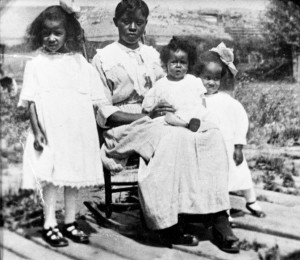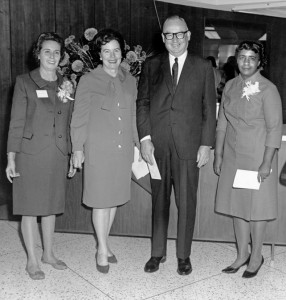Alma Smith Jacobs served as the head librarian of the Great Falls Public Library for almost twenty years before becoming the Montana state librarian in 1973. Both of these achievements were historic firsts for an African American woman. Throughout her life, Jacobs demonstrated a passion for education and for community building and a commitment to working for racial justice in Montana.

Alma Smith was born in 1916 in Lewistown, Montana, to Martin and Emma Riley Smith, members of the wave of African American migrants who had been drawn to the Pacific Northwest between 1865 and 1910. Although Montana now has a reputation for being predominantly white, in the early twentieth century there were sizeable black communities in the state, especially in larger cities like Helena, Butte, Missoula, and Great Falls.
The Smith family moved to Great Falls when Alma was a child. After graduating from Great Falls High School, Alma took advantage of scholarships to achieve an impressive education, first at Talladega College in Alabama and then at Columbia University, where she completed a degree in library science. Credentials in hand, and newly married to World War II veteran Marcus Jacobs, she returned to Great Falls, where she found a position at the public library in 1946. Eight years later she became head librarian. From that position, she worked to build the presence of the library throughout the city and central Montana.
Jacobs recognized the powerful role that public libraries could play in a community. She believed that a good library was a community center and a place for educational opportunities. The idea of self-education was particularly important to her. She wanted the library to be a place where people could pursue the knowledge they needed to learn a new vocation or advance their career. As she would often say, “The public library is the poor man’s university.”

As a member of a minority group in a state with a large white majority, Jacobs’s racial identity was complicated. On the one hand, she was a native of Montana and lived in the state for most of her life. Her tireless effort to better her community through her library work is evidence of her love for her hometown and her state, and she seems to have wanted that work to define her. In a 1967 interview with the Great Falls Tribune she underplayed the importance of her racial identity to her professional career: “I don’t consider myself the Negro authority in Great Falls or anyplace else. I resent being thought of as a Negro librarian. I would rather concentrate on being a good librarian.”
On the other hand, Jacobs’s race was undoubtedly important. She continued to live in Montana after much of the state’s African American population had moved on to larger metropolitan areas, and as a member of this shrinking minority, she worked to advance civil rights and racial justice. She served as president of the Montana Federation of Colored Women’s Clubs and sat on the Montana Advisory Committee to the U.S. Civil Rights Commission. She spoke out against segregation in Great Falls at a time when it was unpopular to do so. Together with her sister, Lucille Smith Thompson, she also worked to document the history of African Americans in the state, an effort that resulted in the 1970 publication of The Negro in Montana, 1800-1945: A Selective Bibliography.
In a way, Jacobs’s professional excellence and prominent stature had the effect she hoped for. As Great Falls architect William Hess once wrote of her, “Her personality is such that after even a one minute meeting you are no longer aware of a race difference.” Yet the very fact that Hess felt the need to comment on her race indicates the extent to which racial difference still clearly defined the African American experience in twentieth-century Montana.
Jacobs died in 1997, but her work to build the Great Falls Public Library has not been forgotten. The city officially proclaimed the week of June 16 to 22, 2009, Alma Jacobs Week, and during that week the Alma Jacobs Plaza at the Great Falls library was dedicated in her memory. AH
If you’d like to learn more about the African-American experience in Montana, check out these posts.
Women played a critical role in developing libraries in Montana. Read “Progressive Reform and Women’s Advocacy for Public Libraries in Montana” to learn more.
Sources
“Alma S. Jacobs (1916-1997).” Online Encyclopedia: African American History in the West. Accessed December 26, 2013.
Hanshew, Annie. “Emma Riley Smith.” In Border to Border: Historic Quilts and Quiltmakers of Montana. Helena: Montana Historical Society Press, 2009, 116-17.
Meredith, Scott. “Identifying African American Resources Project.” Montana The Magazine of Western History 57, no. 1 (Spring 2007): 61-66, 96.
Robison, Ken. “Breaking Racial Barriers: ‘Everyone’s Welcome’ at the Ozark Club, Great Falls, Montana’s African American Nightclub.” Montana The Magazine of Western History 62, no. 2 (Summer 2012): 44-58.
—. “’She is Gentle, Good, and Virtuous’: Exceptional Librarian and Community Leader Alma Smith Jacobs.” The Best of Great Falls (Winter 2012): 20-23.
—. “Alma Jacobs Memorial Plaza,” Historical Black Americans in Northern Montana. Accessed December 26, 2013.
Taylor, Quintard, and Shirley Ann Wilson Moore, eds. African American Women Confront the West, 1600-2000. Norman: University of Oklahoma Press, 2003.
—. “The Emergence of Black Communities in the Pacific Northwest: 1865-1910.” The Journal of Negro History 64, no. 4 (Autumn 1979): 342-54.
“More Interested in Goals Than Achievements . . . Mrs. Jacobs Still Looks to Future.” Montana Parade, Great Falls Tribune, October 29, 1967, 2-3.
Alma Jacobs Obituary. Great Falls Tribune and June 21, 2009, 1a.
A fine and fitting tribute to a great Montanan Alma Jacobs–a true leader and role model for all races. During February each year in Great Falls our Alma Smith Jacobs Foundation and the Great Falls Public Library sponsor Black Heritage Evening–this year February 13th at 6 p.m. Featured will be black history and culture, choirs, poetry, hip-hop dancing, inspirational speeches, and a sampling of “soul” food cuisine. A highlight this year will be announcement of the first Alma Jacobs Memorial Scholarship to be awarded a graduating senior for a Great Falls High School.
I moved to Great Falls in 1961 as a high school student. I spent a lot of time at the public library as well as the book mobile. She was a sweet lady and alway very helpful. It is so true that you never noticed her color, but I never forgot her kindness. I am so thrilled that the library has chosen to honor her in this manner.